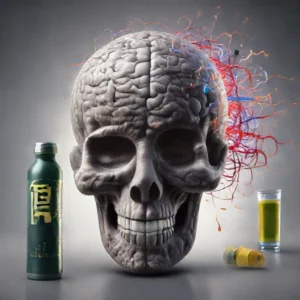Energy drinks are popular, especially among teenagers and young adults, as they promise enhanced performance, increased energy, and improved concentration. However, these drinks contain high levels of caffeine, sugar, and other stimulants, which can significantly affect brain function.
Understanding the side effects of energy drinks on the brain is crucial for making informed decisions about their consumption.
Side Effects of Energy Drinks on the Brain

Here are the top 15 energy drinks side effects on your brain.
1. Caffeine Dependence
When we consume energy drinks regularly, we may develop a dependence on caffeine.
This means my brain starts to rely on the stimulant to function properly. According to the American Heart Association, consuming over 400 milligrams of caffeine daily (equivalent to about four 8-ounce cups of coffee) can lead to dependence.
When I don’t get my usual dose, I might experience withdrawal symptoms like headaches, fatigue, and irritability. This dependence can make it difficult to reduce caffeine intake and may lead to a cycle of increasing consumption.
2. Anxiety and Insomnia
Drinking energy drinks can significantly increase our anxiety levels and disrupt sleep. Energy drinks often contain high levels of caffeine, which can stimulate the nervous system excessively.
This can make me feel jittery and anxious. According to a study published in the Journal of Clinical Sleep Medicine, caffeine can reduce sleep time and alter sleep stages, leading to insomnia.
Poor sleep quality can then exacerbate anxiety, creating a vicious cycle that affects my overall mental health.
3. Impaired Memory and Learning
The high caffeine and sugar content in energy drinks can impair our memory and learning abilities.
Research from Johns Hopkins University indicates that while caffeine might improve alertness in the short term, excessive consumption can negatively affect my ability to recall information and learn new tasks.
This is particularly concerning for students who might use these drinks to stay awake, as it can counterintuitively impair their academic performance.
4. Reduced Decision-Making Ability
When we consume too many energy drinks, my decision-making abilities might suffer. Caffeine can affect the prefrontal cortex, the part of the brain responsible for critical thinking and decision-making.
Studies show that high doses of caffeine can lead to impulsive decisions and reduce my ability to weigh the pros and cons of a situation effectively.
This can have serious implications, especially in high-stakes environments like driving or operating machinery.
Also explore the 15 Long-Term Side Effects of Energy Drinks
5. Changes in Brain Chemistry
Energy drinks can cause significant changes in brain chemistry. They often contain not just caffeine but also other stimulants like taurine and guarana.
These substances can alter the levels of neurotransmitters like dopamine and serotonin in my brain, potentially leading to mood swings and altered mental states. Over time, these changes can affect my overall brain health and cognitive function.
6. Reduced Attention Span
Frequent consumption of energy drinks might reduce our attention span. While caffeine initially increases alertness, habitual use can lead to decreased attention and focus.
According to research published in the journal Addiction, high caffeine intake can disrupt my brain’s ability to sustain attention, making it harder for me to concentrate on tasks for extended periods.
7. Increased Risk of Stroke
High caffeine and stimulant intake from energy drinks can increase the risk of stroke. These drinks can elevate blood pressure and heart rate, which are risk factors for stroke.
A study in the American Journal of Cardiology found that excessive energy drink consumption is associated with a higher incidence of stroke, particularly in younger adults. This risk is compounded if I have underlying health conditions like hypertension.
8. Potential for Addiction
Energy drinks have the potential to become addictive. The combination of caffeine and sugar can create a cycle of dependency similar to other addictive substances.
When we consume these drinks regularly, our brain begins to crave the stimulation they provide, leading to compulsive use and withdrawal symptoms when I try to cut back.
9. Headaches
Regularly drinking energy drinks can lead to headaches. Caffeine, in particular, can cause rebound headaches when its effects wear off.
The National Headache Foundation states that excessive caffeine intake can trigger headaches or migraines, especially if I suddenly decrease my consumption.
Also explore Do Energy Drinks Break Fast?
10. Jitters and Tremors
One common side effect of energy drinks is experiencing jitters and tremors. High doses of caffeine stimulate the nervous system, causing our muscles to twitch involuntarily.
This can be uncomfortable and may interfere with my daily activities, making tasks that require fine motor skills more challenging.
11. Mood Swings
The ingredients in energy drinks can cause significant mood swings. The combination of caffeine and sugar can lead to rapid spikes and drops in blood sugar levels, which can affect my mood.
I might feel euphoric and energized shortly after consuming an energy drink, but this can quickly turn into irritability and moodiness as the effects wear off.
12. Impaired Sleep Quality
Energy drinks can severely impair my sleep quality. The high caffeine content can disrupt my sleep patterns, making it difficult to fall asleep and stay asleep.
Poor sleep quality can lead to daytime fatigue, decreased cognitive performance, and overall health issues.
The Sleep Foundation reports that even consuming caffeine six hours before bedtime can reduce sleep quality.
13. Hearing Problems
Consuming energy drinks might contribute to hearing problems. While not as well-documented as other side effects, some studies suggest that the high caffeine content can exacerbate conditions like tinnitus (ringing in the ears).
The stimulating effects of caffeine can increase blood pressure and stress levels, which may negatively impact my hearing health.
14. Vision Problems
Energy drinks can also affect our vision. Excessive caffeine intake can lead to increased intraocular pressure, which is a risk factor for glaucoma.
Additionally, the stimulants in energy drinks can cause blurred vision and other visual disturbances, making it difficult to see clearly.
Also explore that How Much Caffeine is in Bucked Up Energy Drink?
15. Interaction with Medications
Energy drinks can interact negatively with medications I might be taking. Caffeine and other stimulants can alter the effectiveness of certain drugs or increase the risk of side effects.
For example, combining energy drinks with antidepressants can increase the risk of serotonin syndrome, a potentially life-threatening condition.
It’s important to consult with a healthcare professional about the safety of consuming energy drinks if I’m on medication.
Conclusion
While energy drinks can provide a temporary boost in alertness and energy, their effects on the brain can be more harmful than beneficial in the long run.
Dependence, anxiety, sleep disturbances, and potential cognitive impairment are significant risks associated with their regular consumption.
Understanding these side effects empowers you to make better choices for your brain health. If you need an energy boost, consider healthier alternatives like balanced nutrition, regular exercise, and sufficient sleep.

